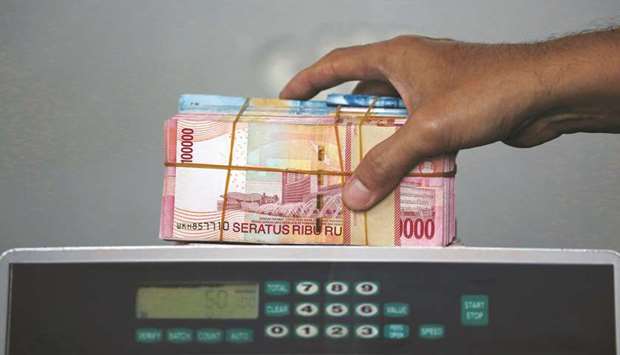The 7-day reverse repurchase rate was held at 5.75%, which Bank Indonesia (BI) senior deputy governor Mirza Adityaswara said is consistent with efforts to narrow the current account gap and maintains the attractiveness of assets for foreign investors.
A Reuters poll had expected BI to pause its tightening cycle this week, taking advantage of relatively calm markets.
Satria Sambijantoro, Bahana Sekuritas economist, said BI may hike next month to pre-empt the US Federal Reserve’s widely anticipated December rate increase.
BI “is merely reloading its ammunition before launching another monetary tightening in November,” he said.
The rupiah, the second worst performer among emerging Asian currencies, has remained around 15,200 a dollar in the past two weeks, near its weakest since the Asian financial crisis.
It barely moved after yesterday’s decision.
The currency is about 11% weaker than its end-2017 level, hurt by capital outflows triggered by rising US interest rates and the United States-China trade war.
Higher borrowing costs may hurt medium-term economic growth.
But although BI said loan growth continued to pick up in August, economic growth was expected to be slower than initially expected in the third quarter.
The deputy governor said growth in Southeast Asia’s largest economy in July-September was expected to be “a little less than 5.1%” and it may pull the rate for full-year 2018 to the lower end of BI’s 5%-5.4% outlook.
BI attributed this to weaker-than-expected export growth due to unfavourable prices of commodities like palm oil and coal.
This, coupled with higher oil prices inflating imports, was likely to slightly widen the third-quarter current account deficit from April-June, Adityaswara said.
The April-June gap was 3% of GDP, already the largest in nearly four years.
Adityaswara said with US and neighbours’ interest rates still rising, BI’s stance “will be to maintain the resilience of Indonesia’s balance of payments”.
The full year current account gap will likely remain below 3% of GDP and efforts to rein in the deficit should bring it down to 2.5% in 2019, he said.
The deficit was 1.7% last year.
BI officials had previously described the central bank’s stance as “hawkish”, including when it made its fifth rate hike last month, but members of the board of governors refrained from using the word yesterday.
The government has raised import tariffs on a range of goods, delayed infrastructure projects and widened biodiesel use to curb imports and support the rupiah.
BI expected inflation to remain within its 2.5%-4.5% target range through the end of 2018.

